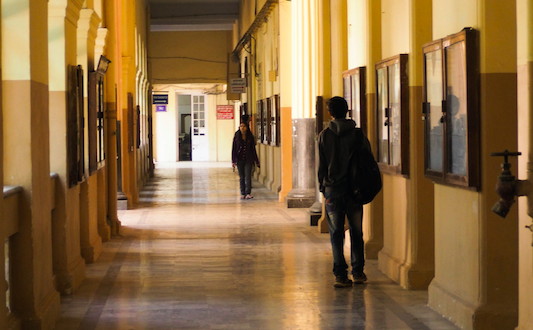At a time when the world and the country grapple with the current pandemic, teachers and students continue to engage academically through e-portals and by circulating study material.
The bureaucratic nature of the University Grant Commission’s recommendations for a future course of action has empowered administrators to bypass statutory bodies, ignore the views of stake holders and further extend the autocratic decision making process within universities.
The modalities about the completion of the teaching term and the timing and nature of examinations have been made by administrators ignorant of implications of their one-size-fits-all decisions on various departments and courses.
Recent announcements in the University of Delhi, where ill-conceived semester and examination plans have been imposed on the faculty for implementation, highlight a new autocratic highhandedness.
The actions of the university bureaucracies will only worsen rather than minimise the already troubled situation. Under the garb of the pandemic and the pretext of maintaining the sanctity of an academic calendar, the administrators have enforced an institutional lockdown on the natural, democratic and consultative decision making processes within the university and in statutory bodies, like Academic Councils, University Senates, Board of Studies, Committee of Courses, etc.
The damage to the inherent collective and consultative nature of the university’s institutional structure will corrode its representative and democratic character. Ironically, the bureaucracy and administrators, who insist on the viability of online teaching and examinations, express an inability to call an online meeting of representative and consultative bodies within the university.
Unlike the teachers, students and the non-teaching staff who have been keeping the university working through the lockdown, the university administrators working from the their secure bastions are unaware of the impact of the sudden lockdown on the academic and working life of the University. They are unable to recognise how the last few weeks opened up an abyss in university life.
Also read: DU Teachers Allege VC Diverted Rs 4-Crore Staff Donations From PMNRF to PM CARES
It is obvious to other stakeholders that universities need to anticipate the various challenges that will confront them when they resume regular academic work. The absence of an agenda that looks beyond the interests of the bureaucracy exposes the short-sightedness of the university administrators.
It is evident that in the next few weeks it will be tough for students expected to travel very long distances to return to their universities and colleges, move into their older accommodation arrangements (if they continue to exist), fight various odds at home and during travel merely to complete their examinations.
The graduating third year undergraduate or second year masters students confronting the challenges will continue to live with the fear of not appearing for examinations for reasons that are beyond their control be it financial, personal or medical.
The online interactive sessions between teachers and students have exposed the limitations of the virtual classroom in education and shown the irreplaceability of the physical and ‘real’ class room.
The attempt to take classrooms online has further re-enforced the existing regional and economic class barriers within universities. It has also exposed the university bureaucracy’s inability to comprehend the significance of analytical skills. These skills are developed outside the theory classroom, in the case of science students within the lab and through practical work and for students in humanities and social sciences, it is through extended discussions with teachers and peers alongside a sustained use of the library.
In the last few weeks the absence of this engagement has left the coursework for the current semester incomplete and examinations in all cases (for students in the second, fourth and sixth semesters) not entirely desirable. The Delhi University administration by merely reducing the duration of the examination and not the number of essay questions that students attempt (four in a regular undergraduate examination) has worsened the situation.
Under normal circumstances the examination process in most Indian universities takes four months to complete, from paper setting to the declaration of results.
In some institutions (like in the University of Delhi) it requires simultaneous preparations for undergraduate examinations (in every) department for five different kinds of undergraduate programmes like the semester, four year undergraduate programme and three different kinds of courses under the choice based credit system (CBCS).
The examinations also involve large gatherings of students, faculty and staff on any given day. As part of the undergraduate evaluation process (like in the University of Delhi), teachers will use public transport to travel to different corners of the city, roughly between 60 to 150 km a day commuting between home, college and evaluation centre.
Given the requirements of social distancing, restrictions on transport and inadequate building infrastructure, the examinations cannot be completed in twenty days.
At the same time, the impracticability of online examinations, the university bureaucracies overlook the fact that examinations for continuing students can be taken along with the next end semester examinations and for that the existing cumulative semester grade along with the internal assessment for the current semester in the calculation of the grade for graduating students. This would be better than the proposal for online open book examinations being proposed by a few universities.
The university bureaucracy’s unprecedented obsession with the examinations rather than their primary administrative responsibilities, like enhancing infrastructure and facilitating the teaching learning process has unnecessarily created new problems.
In the last few weeks the energy, time and money spent on planning the completion of semester and the ritual of examinations ought to have been utilised in assessing and overcoming the institutional inadequacies that will be exposed at the start of the new academic session in July or August.
The pandemic will alter choices of the large migrant student and working population in higher education.
The fear of infection during inter-regional travel, when using public transport (crowded buses, metro trains and rickshaws) will be a cause of apprehension.
Also read: International Students Worried as South Asian University Pushes Them to Go Home
The inability of institutions to provide all outstation students hostel facilities forcing them to rely on off-campus private accommodations will further reenforce a reluctance among students to migrate and result in fewer outstation applications. The options for off-campus accommodation will also be fewer and more expensive than before. Universities will need to expand their residential facilities to accommodate all outstation students.
Inflexible academic schedules and shorter vacation periods will further dissuade the outstation student population from traveling large distances to study. The growing inflexibility and rigid nature of the academic term will worsen the already high levels of stress and fatigue among teachers and students.
In the coming academic semesters, social distancing will alter the way we organise classrooms.
Institutions will need to identify additional financial resources, plan forthcoming academic sessions in shifts and accommodate varying class strengths of 35 to 150 students. The need to reduce the seating capacity in a classroom and the demands of social distancing will test already stretched infrastructural resources.
It is clear that universities will need to address unresolved issues like the stalled recruitment and promotion processes, the lack of scholarships for students and the unsatisfactory working conditions of a growing number of teaching and non teaching contractual staff.
In the ‘new normal’, the ability of the university to reach out and provide greater institutional protection and support to students from economically deprived and non urban backgrounds, to offer campus accommodation for outstation students, to address issues related to the deteriorating working conditions of teaching and non teaching staff, and to improve institutional health care will be bigger challenges than before, requiring urgent redressal.
The university, prior to the ‘new normal’, was designed for large gatherings in class rooms, staff rooms, canteens, dining halls, libraries, science labs, college and university corridors.
This will inevitably change now and the management of these spaces rather than the single-minded obsession with the scheduling of an academic calendar ought to be the primary concern of administrators when universities reopen. Recent academic and structural reforms have revealed themselves to be designs for greater bureaucratic control rather than projects to enhance academic standards.
In the coming days, university administrators who have not been invested enough in nurturing and enabling academic spaces will need to show an eagerness to initiate conversations about the same.
In this extraordinary situation administrators need to prioritise the staff and students who make the university system what it is, rather than an administrative framework and academic calendar which are redundant without the staff and students.
Dr. Mahesh Gopalan is assistant professor at the Department of History, St. Stephen’s College, University of Delhi.




